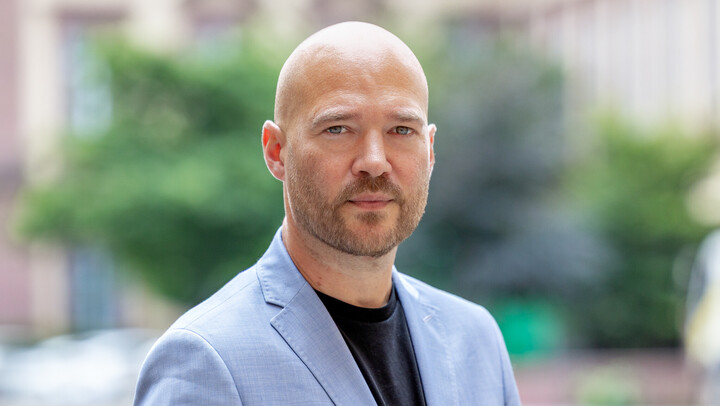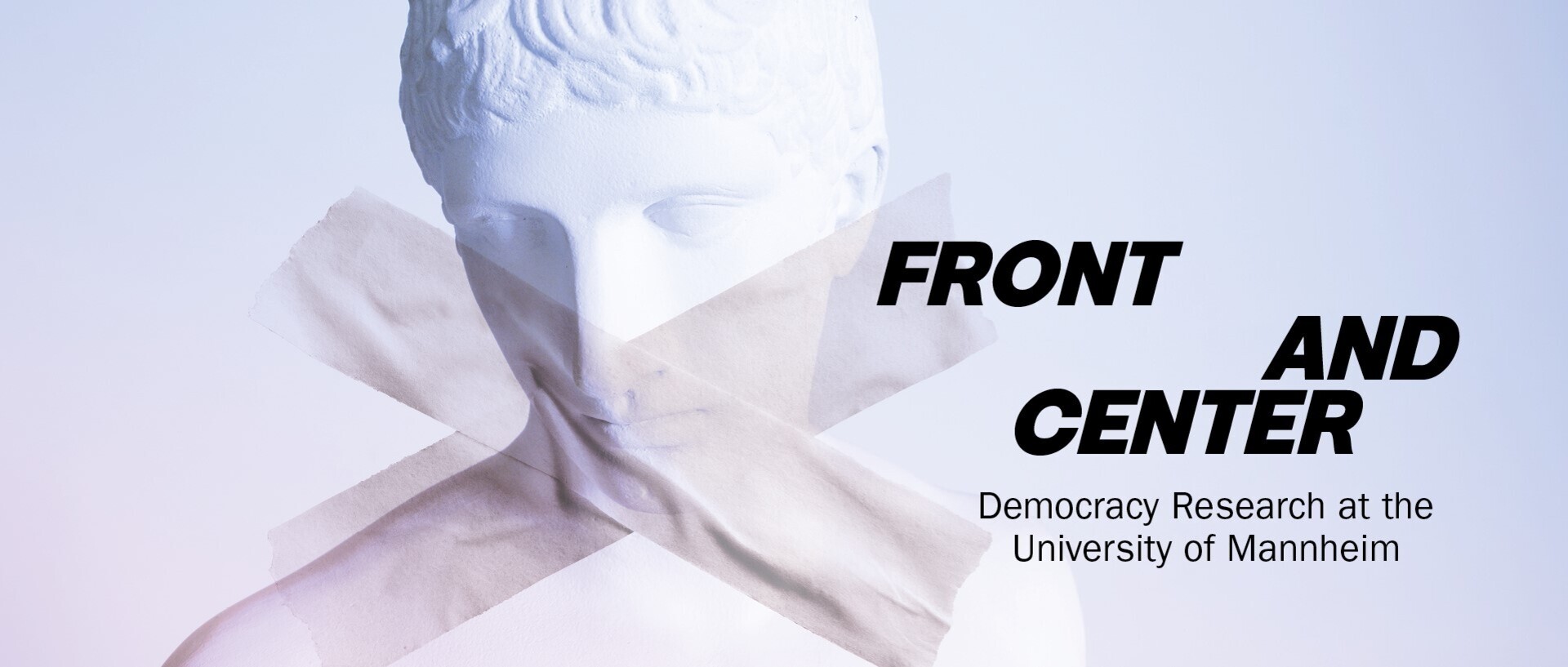Next Project? Free Speech!
Richard Traunmüller has held the Chair of Political Science, Empirical Democracy Research at Mannheim’s School of Social Sciences since 2019. His work explores the social and structural—as well as the psychological and cultural—foundations of democracy; his current focus is on the politics of freedom of speech and censorship. But how does one become a democracy researcher? FORUM visited him in his A5 office to find out.

Mexico, Korea, Saudi Arabia, Singapore, and Thailand—prompted by the seemingly light opening question of where he grew up, Richard Traunmüller gives a delightfully surprising answer. The Austrian-born political scientist can’t help but smile as he offers this illustrious list and quickly adds an explanation: his father was an engineer, and the family moved every few years for his work. As a result, Traunmüller spent his childhood on nearly every continent—except in the small Alpine country listed as his place of birth.
On this sunny May morning, the 44-year-old sits relaxed in his office on the third floor of the A5 building, gazing out over the rooftops of the Mannheim port. Only a few hours earlier, he’d been on a train returning from a conference in Wuppertal on “academic freedom,” which featured some fierce debates. Now, however, he’s in the mood to reflect on his career. How do you become a democracy researcher? Where does he come from—and what motivates him today? Squinting thoughtfully, Traunmüller says: “You know how it is—these stories we tell about ourselves, we often piece them together in hindsight. But looking back now, I do think my biography nudged me to pursue a career in this direction.”
He recalls moments from those formative years: his beloved Kicker soccer magazine, which the family was allowed to have mailed to them—but only with the beer ads and the players’ bare legs blacked out; the religious police who crashed his parents’ New Year’s Eve party; the movie theaters where audiences were required to stand and sing the national anthem for the king—or risk a beating. “Especially when it comes to places like Saudi Arabia, Thailand, or Singapore—those are certainly not democracies as we know them. And you do pick up as a kid that other countries and other cultures can be very different. So it’s probably no surprise that I now study these issues for a living.”

The making of a democracy researcher
After graduating from the Swiss School in Bangkok, Traunmüller had one clear destination in mind: Berlin. And his decision to study sociology and political science at Humboldt University? “That was entirely based on my interests at the time,” he recalls with a shrug. “My mother encouraged me, but my teachers were skeptical and urged me to study something more sensible—like computer science or economics.” By his second semester, he knew: “I want to become a professor.”
Working first as a student assistant at the chair of empirical research, then early on as a teaching assistant, Traunmüller grew increasingly passionate about academia. He loved figuring things out, doing research, teaching others. The political scientist grows visibly animated as he lists the reasons for his early career choice. Another major influence: Herfried Münkler. As a first-year student at Humboldt University in Berlin, Traunmüller attended his first lectures on political theory with the now-retired political scientist—and came away deeply impressed. “To me, Professor Münkler embodied the quintessential German professor. That lifestyle really appealed to me—the freedom to come into the office in the morning and just do whatever you want. At least, that’s how I saw it back then,” Traunmüller recalls, laughing.
Because by now, he knows all too well that the road to that supposed freedom is often a tough one—and, above all, a long one. Traunmüller earned his doctorate in Konstanz and went on to hold positions in Bern, at the University of Essex, the Mannheim Centre for European Social Research (MZES), Goethe University Frankfurt, and the Graduate School of Economic and Social Sciences (GESS) in Mannheim. A stable home? Hobbies? Hard to come by when you’re grinding out paper after paper.
In late September 2019, he received the call from Mannheim. The official offer landed on his phone just as he stepped out of the hospital after the birth of his son. “Mannheim has always been a place where research is done the way I believe it should be done. That moment was just perfect,” he says.
Favorite subject: Democracy
What are the societal foundations of a strong democracy? What qualities do citizens need to bring to the table for democratic government to work? How should they behave? What attitudes must they hold? Traunmüller says he’s always been more interested in the culture of democracy than in its institutional mechanics—like voting systems. That interest, he admits, probably stems from his own life story.
True to Mannheim’s empirical-analytical tradition, he brings a sharp focus and a clear methodology to his research, which explores the social and structural—as well as the psychological and cultural—conditions that underpin democratic life. “If you want to learn what people really think and do, there’s still no substitute for surveys,” says Traunmüller, who also leads the German Internet Panel (GIP), a Mannheim-based survey infrastructure. Every two months, the GIP team fields a new wave of surveys, allowing researchers to respond quickly to current events—a real luxury, Traunmüller admits. “The beauty of my field is that it’s not some ivory-tower exercise. It’s connected to real-world trends—and those can change day by day.”
Free speech, soberly considered
His current research topic—freedom of speech—is a case in point. Traunmüller first became aware of this issue in 2016, at the beginning of Donald Trump’s first presidential term. He noticed a surprising gap in empirical democracy research, which he resolved to help address. Since then, a great deal has been going on in global politics, and his research topic has become increasingly politicized and emotionally charged in Germany as well.
“Even if it doesn’t seem fashionable to worry about free speech right now—because it plays into right-wing narratives—I still believe it’s an important issue to address,” he says. “Not out of a desire to provoke, but in the spirit of Enlightenment and with all due objectivity.” GIP survey data from the past five years have shown a consistent pattern: roughly one in four respondents feel they cannot speak freely—that they can’t say what they really think.
The key question that Traunmüller seeks to explore is: Is that feeling based on reality—or is it all in people’s heads? After all, you can’t have democracy without free speech, he points out. “Free speech plays a vital informational role in democracy, which, at its core, is about people governing themselves. To do so, they need to engage in conversations about what they want—and don’t want,” he explains. “Freedom of speech also helps ensure that political decisions feel legitimate. Citizens are more likely to accept the outcome of political processes if they’ve had the chance to speak up.” Yes, he’s a fan of democracy, Traunmüller says—absolutely. But he’s not a fan of becoming too emotional about it. “I prefer to take a sober view. Democracy is a mechanism that helps people with different opinions reach collective decisions. It’s not perfect—but it works remarkably well.”
In the classroom, Traunmüller brings democratic debate to life. Differing opinions are welcome, and spirited discussion is encouraged—a style that students appreciate, as evaluations confirm. Now in his mid-40s, Traunmüller has reached his goal: a tenured professorship leading his own department. Is it everything he imagined as a student? “I get the privilege to help young people learn how to think for themselves. That’s pretty great,” he says with a smile. “When a lecture goes well, I feel like I just did an hour of yoga—totally grounded and in tune with myself.”
Text: Jule Leger / August 2025

You can find out more about the German Internet Panel in our FORUM article.
